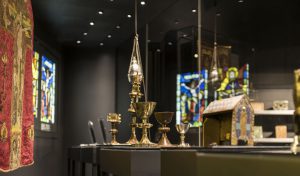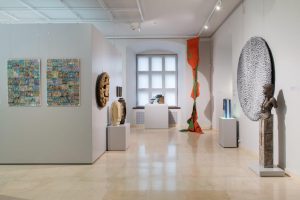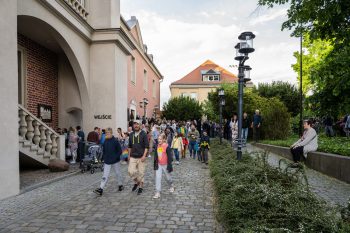The museum collects examples of utilitarian art created from the Middle Ages to the present. These skillfully crafted objects are witnesses to changing tastes, fashions and styles. During our meetings with the audience we present the multi-faceted history of the times in which they were made and the people they served. By telling stories about people from past eras and the beauty they surrounded themselves with in their daily lives, we bring closer their needs, interests and desires, which also tell us a lot about who we are today.
A rich program of events for audiences of all ages, implemented as part of multiple thematic cycles, presents the museum’s collection more broadly, enriching the narrative of the permanent exhibition, but also going beyond it.
FRIDAY WALKS
Slow but dynamic, peaceful yet full of energy – these are the Friday walks in the Applied Arts Museum. We warmly invite you to take a stroll in our halls every Friday evening. The routes for these walks are planned along very unexpected paths. The exhibits we will pass by together will reveal their secrets, let us know them from a different perspective, take us to the past so that we can look at the present anew.
02/09/2022, Friday, at 6:00 p.m
Taste history
Is it true that in the age of the internet, where we post pictures of our meals on social media and Instagram is full of food styling and table decorations, we are witnessing an unprecedented cult of food? How were meals celebrated in the past, how were tables decorated and what could have been found on the plate? Let’s go on a historical journey of the palate together – we will find out that the combination of culinary and aesthetic taste is an eternal duo. Attention! A walk with recipes.
Leading: Aleksandra Nieścioruk
25/11/2022, Friday, at 6:00 p.m
Space on the meadow, or flowers on fabric
Let’s take a look at the herbarium, whose cards make up our fabrics. Fantastic and realistic flowers, in addition to decorative functions, hide codes and meanings. Why did the sarmatians like cloves and what do cornflowers have in common with Queen Maria Antonina? A walk through our flower meadow is a great opportunity to gain knowledge and a feast for the eyes!
Leading: Marianna Czerwińska
20/01/2023, Friday, at 6:00 p.m
Glass weather
Clear skies, blue glass for the televisions! Clear skies, a glass is coming… though we hope with humor!
In a glassy (though not television) program, the exquisite works of Italian masters, Biedermeier sentiments, Art Nouveau fantasy, Niemen and Lalique, Finnish love of nature, and postwar freedom and creative freedom of Polish unique artists.
Leading: Karolina Aszurkiewicz
March 2023
Ariadne’s Thread – the golden thread in the fabric
Forgotten words: bajorek, szych, galon now only exist as surnames, while the word “brokat” is often used incorrectly. We will not be misled by forgotten names and follow the thread to the hank to discover the secrets of beautiful, shiny materials.
Leading: Marianna Czerwińska
May 2023
Barbie – An Unknown Face
We invite you to take a tour of the exhibition showing the power of Barbie’s influence. It will be a story about culture and events of recent years in which Barbie has participated, which she has reflected, and sometimes even created. We will look at more than 60 years of Barbie’s history, in which – like in a mirror – the history of all women is reflected.
Leading: Aleksandra Podżorska
REGISTRATION
Reservations for meetings are taken over the phone from 11:00-16:00 from Tuesday to Sunday at 61 85 68 075. The number of places is limited to 25 people. The museum reserves the right not to accept applicants in case of lack of free places.
PRACTICAL INFORMATION
- Attendance at the meeting is only possible upon prior registration.
- If you cannot attend the meeting, please inform us immediately.
- Photography of exhibits is allowed during the visit to the museum, however the use of flash and tripod is prohibited.
- During the organized classes at the National Museum in Poznań, the Visiting Regulations of the MNP apply.
Icon Design
In the next installment of the “Icons of Design“ series, we will search for answers to the questions that plague us: What is good design? Does a utilitarian object have to be beautiful or is it enough that it is functional? And is functionality a necessity?
Can you find truth and meaning in the illogical statement “the less, the more”?
08/10/2022, Saturday, at 1:00 p.m
Space Age design
Would you like to find yourself for a moment in the cabin of a spaceship or have a room with a view of the surface of some unknown planet? Since the 1950s, the perspective of an extraterrestrial expedition or even living in space has become (at least in popular culture) increasingly real. The race between the USA and the USSR in attempts to conquer space resulted in a phenomenon in global design called “Space Age design”, in which new technical perspectives were combined with an interest in abstract and streamlined shapes. The space craze also did not bypass Poland – our designers from the mid-1960s offered interiors in a more futuristic climate.
Leading: Michał Błaszczyński
17/12/2022, Saturday, at 1:00 p.m
Porcelain – Ceramic Queen
How did it come to pass that a mixture of kaolin clay, shale, and quartz fired at a high temperature could capture the collective imagination?
How is it possible that although she was priceless like gold, you could find her where the king walks on foot?
We invite to a meeting where we will try to trace the history of this remarkable material, from Chinese workshops through European manufactories to modern, not only mass production.
Leading: Karolina Aszurkiewicz
February 2023
Witaczkowie – Silk from Milanówka.
After the war in Poland, silk was simply referred to as “Milanówek”. The less known name of the siblings who founded the company in the 20th century is Stanisława and Henryk Witaczkowie. This was not just a company, but a dream and vision that created the Polish silk industry. We will find out what the Ball of Polish Silk was and why President Mościcka got married in a green silk dress. We will also learn how to tell the difference between real and fake silk.
Leading: Marianna Czerwińska
April 2023
Iron – an icon of design?
Can cast iron—a material that became “iconic” in art in the early 19th century—be considered an icon of design, since the concept of design (in its contemporary understanding) did not yet exist? Karl Friedrich Schinkel, one of the most renowned creators of classicism, an architect, urban planner, designer, and painter, particularly favored designing cast iron products with very versatile uses. And so one may ask… was Schinkel a designer?
Leading: Renata Sobczak-Jaskulska
June 2023
XX
XX – the female sex chromosomes. Their role was discovered in 1905 by American scientist, biologist and geneticist, Nettie Stevens. It is about such women as she, their history, role and importance in society in the second half of the 20th and early 21st centuries that this meeting will be about. We will tell this story, looking at the most famous doll in the world. Barbie will never be a silly blonde doll for you again, but will become an icon of the fight for gender equality, regardless of age, skin color or health.
Leading: Aleksandra Podżorska
COST
- Entrance ticket for PLN 15
- No sign-ups are required for the meeting.
Thursdays for Seniors
“Thursdays for Seniors” is a series of walks aimed at audiences aged 60+, but open to all age groups. On one Thursday of each month we will set off together with a guide on the trail of intriguing questions that can be discovered at the Applied Arts Museum. The comfort of our visitors is the most important thing for us – a leisurely pace of sightseeing and hours of walking that are friendly for the elderly.
27/10/2022, Thursday, at 12:00
Many/ Few. Curatorial Tour on Minimalism and Horror Vacui for Seniors
The idea of the exhibition is to show two opposite ways of composition building: one based on a conscious limitation of expressive means and the concept of horror vacui – a deliberate filling of space with numerous details or ornaments present not only in posters but also in illustrated books and press covers.
This presentation fits into the “Graphic Concept” series, a series of meetings and exhibitions showcasing the rich collection of Poster Gallery and Graphic Design of the National Museum in Poznan.
Leading: Barbara Górecka
15/12/2022, Thursday, at 12:00
Examples of Edifying and Non-Edifying Entertainment
How did generations before us have fun? It was sometimes the case that past amusements combined pleasure with usefulness, but ages ago the need for unrestrained revelry was also not unknown! To learn about what was done in the past to not go overboard, about dancing, lavish feasts, both intellectual and gambling games, as well as various indulgences, our exhibits – witnesses of all sorts of craziness – will tell you.
Leading: Aleksandra Nieścioruk
February 2023
Drawers, small drawers
Leading: Michał Błaszczyński
April 2023
Barbie – An Unknown Face
We invite you to take a tour of the exhibition showcasing the lesser-known and rarely discussed threads of the over 60-year history of the Barbie doll. The world’s most famous doll will take us through important social issues such as racism and exclusion due to illness, disability, gender and age.
Leading: Aleksandra Podżorska
May 2023
Everything for ladies
Meeting with the history of Barbie – the world’s most famous doll – will be a pretext to look at the permanent museum exhibition through the eyes of women: for women, about women, by women, thanks to women.
Leading: Karolina Aszurkiewicz
COST
- Admission ticket to the exhibition
REGISTRATION
Reservations for meetings are accepted by phone from 11:00 am to 4:00 pm from Tuesday to Sunday at 61 85 68 075. The number of places is limited to 25 people. The museum reserves the right to refuse applicants in case of lack of space.
PRACTICAL INFORMATION
- Attendance to the meeting is only possible upon prior registration.
- If you are unable to attend the meeting, please inform us immediately.
- Photography of exhibits is allowed during your visit to the museum, however, flash and tripods are not permitted.
- During organized activities taking place at the National Museum in Poznan, the Visiting Regulations of the National Museum in Poznan apply.
GRAPHIC CONCEPT
Under the name “Graphic Concept” there is a series of activities presenting the Poster Gallery and Design in the Museum of Applied Arts. This year’s meetings will be devoted to the artists previously honored with the Jan Lenica Award. The Jan Lenica Award was established in 2001 by the National Museum in Poznań after the death of the artist, one of the creators and most important representatives of the Polish school of poster, born in Poznań. The award is given to outstanding graphic designers from all over the world, with a shaped artistic personality, representing a similar attitude that characterized Lenica, i.e. going beyond the narrowly understood frame of the graphic designer. The poster and other graphic forms then acquire the characteristics of an individual artistic expression, serving a creative, fully autonomous expression of the artist’s attitude towards the surrounding world. The theme of this year’s Graphic Concept was chosen in connection with the preparations for the exhibition of the winner of the seventh edition, Japanese graphic designer Kenya Hara (spring 2023).
15/10/2022, Saturday, at 1:00 p.m
Michel Bouvet (France)
Bouvet, the Laureate of the Jan Lenica Award (2002), specializes in poster design, graphic symbols, developing a full visual identity for institutions and cultural events. Poster design is subordinated to the primary role of the recipient. He uses images that are understandable to any generation, bypassing all fashions and novelties, searching for a simple, universal language that is a kind of balanced compromise.
Leading: Irena Przymus
12/11/2022, Saturday, at 1:00 p.m
Gunter Rambow (Germany)
Rambow is a Laureate of the Jan Lenica Award (2004). His main creative domain is social and theatrical poster. At the beginning of his career, he mainly used pure or processed black and white and color photography. Later, mostly graphical compositions with a palette of two or three colors and large poster formats dominate.
Leading: Barbara Górecka
03/12/2022, Saturday, at 1:00 p.m
Alain Le Quernec (France)
Laureate of the Jan Lenica Award (2006). Le Querneca’s posters, not devoid of critical distance and humor, are characterized by the multilayeredness of the conveyed messages. The topics discussed often have a universal and timeless dimension. The set of graphic solutions used by the artist undergoes constant evolution: from drawing and painting gesture dominating the initial phase of creativity, through pure and processed photography, to the latest graphic solutions based on form and color.
Leading: Irena Przymus
14/01/2022, Saturday, at 1:00 p.m
Ralph Schraivogel (Switzerland)
Laureate of the Jan Lenica Award (2009). He has made a significant contribution to the shape of the poster not only in Switzerland, but also all over the world. He belongs to the new generation of designers who are questioning the assumptions of the “Swiss style” based on rationality, readability and functionality. Schraivogel is not the only artist who contributed to the renewal of the Swiss poster, but the originality of his personality makes him undoubtedly one of the outstanding poster creators in the world today.
Leading: Anna Grabowska-Konwent
February 2023
Uwe Loesch (Germany)
Uwe Loesch has been awarded the Jan Lenica Prize (2013) among the world’s most outstanding poster creators. His artistic personality is completely independent in formulating the message and surprising with unconventional solutions. By combining typography with photography and word with image, he creates strong visual messages that are characterized by clarity and restraint in graphical solutions, as well as his own independent way of expressing ideas. In the contemporary history of graphic design, Uwe Loesch holds a privileged position – an artist philosopher and independent thinker.
Leading: Barbara Górecka
March 2023
Michel Quarez (France)
Michel Quarez, having experimented with new graphic techniques, consciously introduces a painting composition into the poster, where gesture and color seem to ignore the edges of the paper. He usually paints on paper attached with tape directly to the wall. He transforms the image into a poster, adding texts that he usually adds with his own, hand-written handwriting. When looking at his posters, we experience “painting” almost directly, figures and stains of the colorful background literally drip paint, giving the feeling of participating in the very act of creation. In his works he skillfully transposes important social topics into the graphic language of the poster.
Leading: Anna Grabowska-Konwent
COST
- Entrance ticket for PLN 15
ZAPISY
- No sign-ups are required for the meeting
Can you only look at art? Of course not! We can use works of art every day, even if we don’t realize it… But can we create our own work of art – one that we can use to send secret messages, or wear?
At the start of each class, we will explore an unusual object from the past. What was it used for? Was it owned by someone special? Where did it come from? After our visit to the exhibit, we will get to work and learn new artisan skills. We will create objects similar to the ones we discovered in the museum. No prior crafting skills are necessary – all you need is a curious spirit and a desire to discover!
Leading: Aleksandra Nieścioruk
24/09/2022, Saturday, at 12:00
What is it made of, so can you only look at it as art?
Together, we will discover that art can be experienced not just through the sense of sight. During everyday use of artistic objects, they can not only be beautiful, but also soft, warm, cold or smooth. We will ponder together why this is so and if one can be an artist without using their eyes.
22/10/2022, Saturday, at 12:00
We paint on fabric, so where do the patterns on silk kimonos come from?
Do all elegant outfits look the same everywhere in the world? Where did porcelain and tea come from? Let’s have a get-together about traveling and how the unknown can be beautiful and inspiring. Together, we will learn the Japanese art of fabric decoration.
19/11/2022, Saturday, at 12:00
In a world of amazing plants, animals, and creatures. We make medieval tiles and tiles.
On tiles and cards there are hidden extraordinary animals, plants and places. How did they get there?
We will jointly take on the roles of medieval craftsmen, discovering ancient techniques and reflecting on the value of work.
10/12/2022, Saturday, at 12:00
Christmas Tale of the Shepherds and Three Great Magi. What is Intarsia and how to make it?
We invite you to a festive gathering, during which we will discuss equality and the extraordinary power of holiday gifts. As we put together intarsia, we will consider how to beautifully complement each other.
28/01/2023, Saturday, at 12:00
About the fight between the wild boar and the unicorn in an enchanted forest – we weave tapestries
What does it mean to be loyal as a dog or hardworking like an ant? Do unicorns really exist? Can you tell “something” by presenting “nothing”?
February 2023
How to send secret messages and are ladybugs only fruitflies. How to make your own fan?
How to send strictly confidential messages? One can create a secret language! Can we converse without using words?
March 2023
We paint pictures with light. We create our own stained glass.
About sometimes it is hard to shine by yourself – why does a stained glass window need light?
April 2023
About Easter gifts and an extraordinary queen – we make Easter gifts.
Where did the Easter eggs on the Easter table come from? It’s a very long story… We’ll find out how our ancestors decorated Easter eggs and why they are still a popular Easter gift!
May 2023
About travel souvenirs. Postcards painted on glass.
What makes different places special for us and why do we need souvenirs from our travels? What if we could make a souvenir from a place that… doesn’t exist?
June 2023
The Mystery of Clocks. How does a sundial clock work? Make one yourself!
What is time? Where do we know it passes? What secrets do old clocks keep? How did people manage without an alarm clock? Together we will see if we can see time! We will need sunshine rays for that…
COST
- Entry ticket PLN 15 per child
- The guardian of the child is entitled to free admission (1 guardian per 1 child), additional adults must purchase an admission ticket to the exhibition.
REGISTRATION
- Email registrations must be sent to the address: edukacja.msu@mnp.art.pl
- Registrations are accepted from Monday to Friday of the month in which the course takes place.
- The registration should include: first name, last name, age of the child, contact phone number.
- The number of places is limited – the order of registrations is decisive.
- The condition of participation is obtaining an email confirmation of the entry on the list of participants.
We invite people with intellectual disabilities to take advantage of our educational offer – school, preschool, integrative and therapeutic groups. For people with disabilities, visiting the Museum can be both a challenge – when they get to know its space and atmosphere, as well as the rules of conduct applicable there – as well as an opportunity to develop communication and social skills. Above all, however, this meeting with art is to be an impulse to stimulate cognitive abilities, creativity and artistic sensitivity.
Proposed Class Topics:
Museum Animals
During the class, we will go on a search for animals that inhabit our museum – those fantastic, exotic ones and those that we can meet during a forest trip. We will get to know their characters and their extraordinary stories, and we will find out how helpful and important they are to us in our daily lives. Will we track them all down?
Lucky 13
The Tale of the Thirteen Most Significant Exhibits of the Museum of Applied Arts
PRACTICAL INFORMATION
COST
- lesson without workshop: PLN 85 (per group)
- children under 7 get free tickets
- the group can consist of up to 15 people
REGISTRATION
Lesson reservations are accepted by phone between 8:00-15:30 from Monday to Friday with a minimum of one week’s advance notice at 725 270 076. The Museum reserves the right to decline an order in case of lack of availability.







